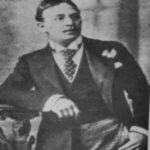JEFAR II, ABA
- 2 Min Read
Aba Jefar II (1861-1932) was the fifth and most important King of Jimma, a Muslim state in south-western Ethiopia, which he ruled from 1878 to 1932. During his rule, Jimma extended its borders at the expense of the neighbouring kingdom of Janjero to the east, became prosperous through expanded trade, and remained free from the direct occupation by the Amhara, under the leadership of Emperor Menilek II (ruled 1889 – 1913).

PHOTO CAPTION: Aba Jefar II SOURCE:EA Library
When Aba Jefar became king, Menilek was expanding the Ethiopian empire southward. But when in 1884, Aba Jefar agreed to pay an annual tribute to Menilek, and to aid him in his campaign against other southern states, Jimma was recognised as an internally autonomous tributary of Ethiopia. Jefar’s armies helped in the conquest of Kulo to the south (1889). Walamo to the northeast (1894), and Kaffa to the southwest (1897). For a while Jefar was allowed to govern the neighbouring states of Janjero and to the west, Gera.
Jefar kept tight control over military organisation, taxation, justice, trade, and markets. He maintained a large and lively court at his capital, Jeran and hired foreign artisans to help in constructing palace buildings. When he died, his grandson, Aba Jobi, succeeded him. Shortly thereafter, however, the kingdom of Jimma was taken over by the central government and administered directly from Addis Ababa.
HERBERT S. LEWIS



